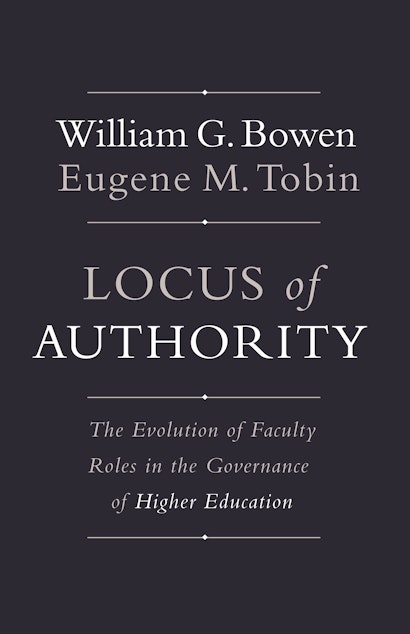Do higher education institutions have what it takes to reform effectively from within? Locus of Authority argues that every issue facing today’s colleges and universities, from stagnant degree completion rates to worrisome cost increases, is exacerbated by a century-old system of governance that desperately requires change. While prior studies have focused on boards of trustees and presidents, few have looked at the place of faculty within the governance system. Bowen and Tobin explore whether departments remain the best ways through which to organize decision making and if the concepts of academic freedom and shared governance need to be sharpened and redefined. Using case studies of four very different institutions, the authors demonstrate that college and university governance has capably adjusted to the necessities of the moment and governance norms and policies should be assessed in the context of historical events. They also demonstrate that successful reform depends on the artful consideration of technological, financial, and cultural developments. Locus of Authority shows that the consequences of not addressing college and university governance are more than the nation can afford.
Awards and Recognition
- Winner of the 2016 PROSE Award in Education Theory, Association of American Publishers
"[An] eloquent exposition."—Inside Higher Education
"William Bowen and Eugene Tobin's new book, Locus of Authority: The Evolution of Faculty Roles in the Governance of Higher Education, has just been published: anyone interested in the governance of universities and colleges should read it."—Henry Farrell, Washington Monthly
"Compelling. . . .Locus of Authorityis worth reading. . . as an invitation to a conversation that is relevant to students, alumni and taxpayers as well as higher education ‘insiders.'"—Glenn C. Altschuler, Huffington Post
"Through a sweeping yet incisive history, Bowen and Tobin . . . present best practices for allowing American education to remain an engine of upward mobility and, thus, a guarantor of global competitiveness. Fortunately, the authors are highly qualified to examine this issue of tremendous import. . . . Locus of Authority is an obligatory study for anyone involved with higher education. It's additionally a must-read for anyone concerned with the fate of American society."—Jonathan Bronitsky, Key Reporter
"[A] thoughtful, well-informed conversation."—Choice
"We are often so frustrated by each other that we squander the energy crucially required to defend the liberal arts by fighting amongst ourselves. As William G. Bowen and Eugene M. Tobin amply argue. . . there is much misunderstanding and suspicion on both sides. . . . [Locus of Authority] is extremely thoughtful and detailed in regard to all aspects of a crisis long neglected, and indispensable reading for both sides of the divide."—Chronicle of Higher Education
"Withering critiques of the academy appear daily, predicting the end of higher education as we know it. Bowen and Tobin step into this fray with insight, deep knowledge of the field, data, and a good eye for history. Their eminently sensible book convincingly argues that higher education institutions have evolved over time in response to pressures and challenges, and that they are capable of continuing this evolution."—Lawrence S. Bacow, president emeritus, Tufts University
"This timely book thoughtfully explores the challenges of decision making at our universities today. Bowen and Tobin make lucid recommendations, some controversial, about the delineation of authority between the faculty and administration. Their book should be in the hands of every university trustee, president, administrator, and faculty leader and will stir healthy debate across the higher education landscape."—William Kirwan, chancellor, University System of Maryland
"Everyone who follows news about higher education or participates in that arena professionally is aware that faculty-administration relations are a vexed issue right now. Yet there hasn't been a concise and deeply informed volume that addresses the history, contemporary issues, and prospects for constructive action—until now. This lucid and persuasive book makes an important and highly distinctive contribution."—Michael S. McPherson, president, Spencer Foundation
"Locus of Authority proposes that solutions to current issues in American higher education are impeded by an out-of-date system of governance. Addressing such problems as cost containment and effective uses of technology, the authors show that answers depend on ‘not business as usual' decision making that cuts across institutional boundaries. I am not aware of another book that approaches institutional change in this way."—Mary Patterson McPherson, president emeritus, Bryn Mawr College and executive officer emeritus, American Philosophical Society


